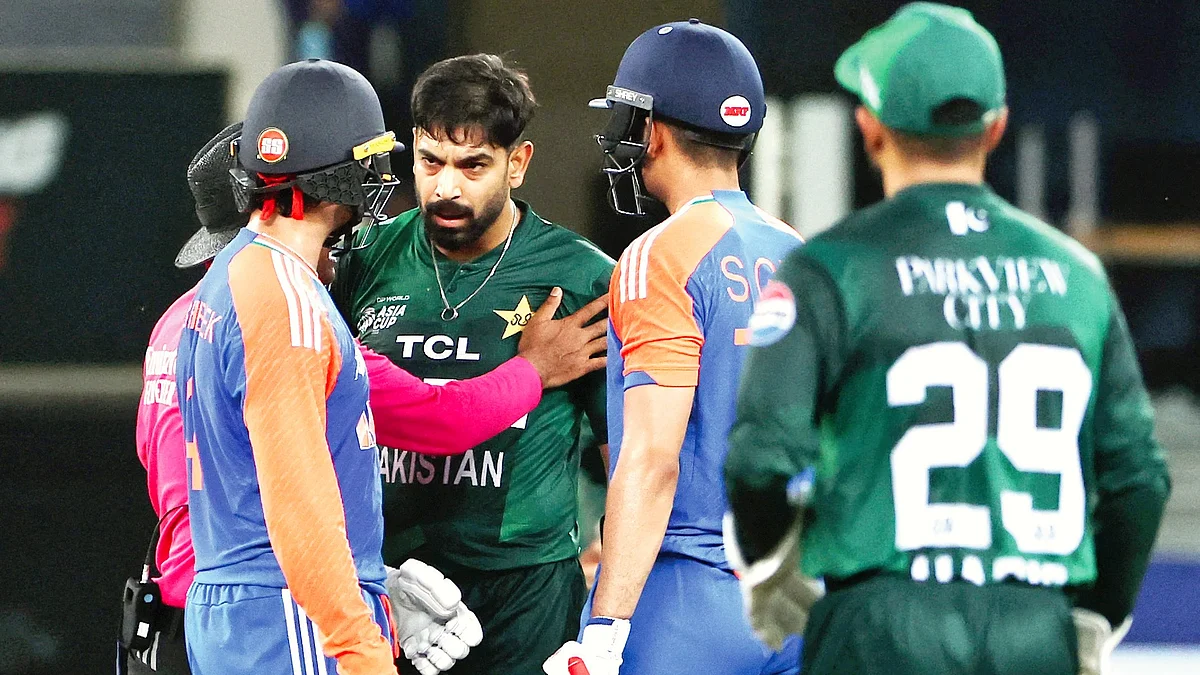The thrill of war, with not even a scratch
The India–Pakistan Asia Cup clash was not so much a game of cricket as a money-spinning spectacle wrapped in political theatre

Like most Indians, I too am a cricket buff. Even in the midst of the daily grind, I’m tempted to catch snatches, maybe just a few overs, of an ongoing match. Even when I don’t manage, I still keep tabs on the score. But I didn’t watch the India–Pakistan clashes in the Asia Cup this time. I just didn’t feel like it. What I read and heard about it just killed my appetite.
The Asia Cup fiasco took me back to childhood. King Kong was in town for a freestyle wrestling match. Who he fought, I don’t remember; it doesn’t matter. For weeks before the bout, there were public announcements in town and giant posters met your eyes wherever you went. The newspapers carried savage quotes — sometimes from King Kong, sometimes from his opponent: “I’ll toss him out of the stadium!”, “I’ll have him for breakfast!” and other such hyperbole.
There was no social media in those days. We weren’t inured yet to daily inflammatory trash. So those lines shocked us, stirred our curiosity. The hype worked. The whole town turned up to watch the bout. I didn’t go — wrestling didn’t appeal to me. But King Kong flattened his rival — and that was that. Game over, the talk of the town was that the match had been fixed.
Now, I’m not suggesting the Asia Cup India–Pakistan match was fixed. It didn’t need to be. Ever since the IPL opened the gates of Indian cricket to small-town talent, the Indian team has reached a different level altogether. If India had fielded two teams in the Asia Cup, both might have reached the final. Which is why, barring a dud match here and there, contests with Pakistan these days are pretty one-sided.
Also Read: ‘Just not cricket,’ as the saying goes
They no longer have the edge they once did, back when Zaheer Abbas, Imran Khan, Javed Miandad, Wasim Akram or Shahid Afridi were in the Pakistan lineup. Today, India is a mecca of international cricket. To consider Pakistan the primary rival of this Indian team is to belittle its stature.
But that’s not the real reason I skipped the matches. It was obvious from the get-go that this was not so much a game of cricket as a money-spinning spectacle for the market and political theatre for the state. It was a foreign policy gambit, a game of keeping the public drugged on a diet of fake nationalism.
From day one, the whole debate about whether India should play Pakistan rang hollow. The cricket board’s defence was weak: calling it an ‘international obligation’ was nonsense. The Asia Cup isn’t the World Cup — India could have opted out. Plenty of countries have boycotted even the Olympics for political reasons.
Calling it an ‘autonomous’ decision by the BCCI (Board of Control for Cricket in India) was even more laughable. Who doesn’t know whose son heads international cricket today, or in whose ministerial bungalow Indian board officials are chosen?
Everyone knows it was a market-driven decision, for India–Pakistan matches sell like nothing else does. The organisers knew this dream product would be hotter right after a war, and before the festival shopping season, the prospect mouth-watering. Especially in Dubai, where the rich of both countries can sit far from home, taking no risks, and indulge in make-believe patriotism.
Much like the daily circus at the Wagah border, where Indian and Pakistani guards put on a choreographed frenzy of enmity, patriotic songs blaring, crowds lapping it all up. The full thrill of war, without so much as a scratch. The cheapest, most consumable version of nationalism, subsidised by the blood and sacrifice of real martyrs.
On the other hand, the arguments of those opposing the match don’t quite wash either. Yes, they had every right to call out the Modi government’s double standard. When the government insists that ‘Operation Sindoor’ is still on and is asking Pakistani nationals to leave the country, how is it okay to let the Indian cricket board rake in profits off a match with Pakistan?
Fair point. But when these critics go on to say that “playing with the enemy” was a betrayal of the nation, they fall prey to the same diseased mindset. Art, sport, culture are meant to build bridges, not destroy them. When Dilip Kumar honoured legendary singer Noor Jehan, or when Neeraj Chopra threw an arm around his rival Arshad Nadeem, or the heartfelt on-field gestures of Virat Kohli and Babar Azam — these are fine examples of how sports and cultural icons should behave.
When players refuse to shake hands, they diminish themselves, their countries and the game. When they are prodded to make retaliatory war gestures on a cricket field, they only wound the ‘spirit of cricket’. But don’t blame the players — they are not free agents in this drama.
Views are personal
Follow us on: Facebook, Twitter, Google News, Instagram
Join our official telegram channel (@nationalherald) and stay updated with the latest headlines
